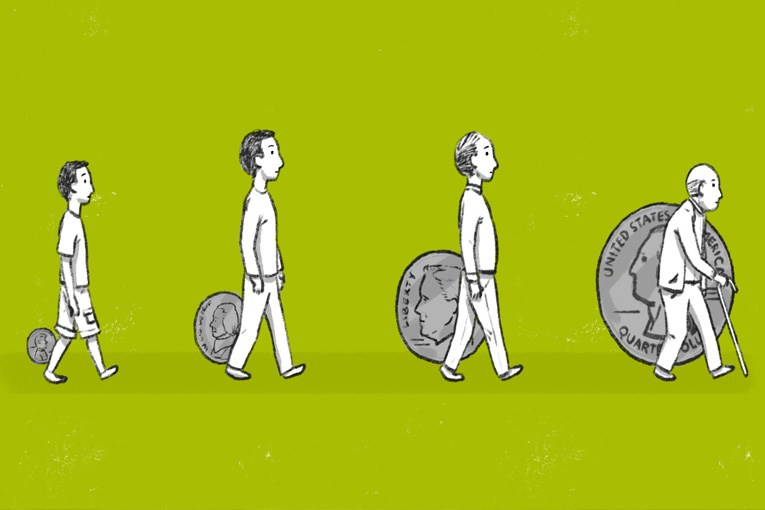- Home
- It's All About Community
- Chesapeake Bank Blog
- Social Security Basics
Since its introduction in 1935, in the wake of the Great Depression, Social Security has evolved from a safety net designed to relieve poverty to the mainstay of a secure retirement. But the role it will play for future generations is less certain. Fewer workers will be putting money into the system in the 21st century while more will be collecting benefits.
What You Contribute
If you’re in the Social Security system — and more than 96% of the workforce is — you usually contribute 7.65% of your salary every year, 6.2% for retirement and disability benefits and 1.45% for Medicare coverage. Your employer contributes an equal amount, and if you’re self-employed you pay both shares. There’s an annual cap on contributions for retirement and disability but no cap on Medicare contributions. However, during 2019, employees are required to contribute just 4.2% of their earnings, up to the cap of $132,900. That reduction is part of the government’s economic stimulus program.
Figuring the Benefits
The formula the Social Security Administration (SSA) uses to calculate your primary insurance amount (PIA) — the base on which your benefit is figured — is designed to give you credit for your 35 highest paying years, thereby increasing the amount you’ll receive.
Here's how it works:
- Your lifetime earnings (to age 60) are adjusted for inflation, so they’re counted at their current value.
- Your total earnings are divided by the number of months you worked, to find what’s known as your average indexed monthly earnings.
- Your permanent base benefit is figured on your average indexed monthly earnings.
Looking at the Numbers
According to recent statistics, there are three people working—and putting money into the system—for every retired person. That’s a far cry from 1950, when there were 16 workers for every retired person. By 2030, estimates are that the number will decrease to two workers for every retired person.
How You Qualify
You qualify for Social Security benefits in two steps:
- You contribute to the Social Security system, usually with money your employer withholds from your salary
- You accumulate 40 credits during the years you work. You can get up to four credits a year, one for each time you earn the minimum required for that year.
In 2019, you receive one credit for each $1,360 of earnings. Each year the amount needed for credits goes up slightly as average earnings increase. You can only earn up to four credits per year.
So a person who earns $10,000 a year and a person who earns $100,000 a year each accumulates four credits. If you work full time, you’ll be fully qualified in ten years, but you’ll also qualify if you gain the credits more sporadically.
However, the benefits you receive depend more on the amount you contribute to the system and how old you are when you begin taking benefits than on simply accumulating the credits to qualify.
Where You Stand
You can start collecting Social Security benefits as early as 62 or as late as you wish, though there is no point in waiting past 70 since the base amount you eligible for won’t increase any more.
The earlier you begin to receive your benefits, the smaller the annual amount you receive. If you’re not working when you turn 62, and Social Security income would help cover your living expenses, you may want to start collecting. If you were born after 1954, you’ll be eligible for a gradually decreasing percentage of the amount you would receive if you were 66, which is your full retirement age (FRA). For those born in 1960 and later, it is 70%. That reduction is permanent.
When you reach your FRA, which is scheduled to increase gradually to 67 for people born between 1955 and 1960, you are eligible for your full benefit. For each of the years you wait past your FRA and before you turn 70, you get an 8% credit.
You can estimate your Social Security income at any age by going to ssa.gov/estimator and following the directions.
You Have to Apply
You don’t get your benefits automatically. You have to apply to the SSA, and the time to begin is in the year before you plan to retire or take benefits. One reason to plan ahead is that you may be able to adjust your start date and increase the overall amount of your benefits.
Taxes on Benefits
You may have to pay tax on part of your Social Security benefits, reducing the amount you’ll have available to live on. That happens when your total income for the year, including half your Social Security payment, is more than the levels set by Congress.
What’s perhaps surprising is that you might find yourself in this situation even if your income seems modest. That’s because the income limits are relatively low and practically all of your income is counted, even earnings on tax-exempt investments.
If you’re single and your income is between $25,000 and $34,000, you must include 50% of your benefit in your taxable income, and if your income is over $34,000, you must include 85%.
If you’re married and filing a joint return, the income levels are slightly higher. If your income is between $32,000 and $44,000, you must include 50% of your benefit in your taxable income. If it’s over $44,000, you must include 85%. If you’re married but file separate returns, you must always include 85% of your benefit in your taxable income, regardless of income.
-
Categories
Posts by Topic
- Business (98)
- It's All About Community (73)
- Personal Finance (70)
- CFS News (49)
- Employees (46)
- Northern Neck (37)
- Middle Peninsula (34)
- Chesapeake Payment Systems (27)
- Richmond (26)
- Williamsburg (20)
- Fraud & Security (17)
- Home Buying (12)
- Chesapeake Wealth Management (11)
- Flexent (11)
- Customer Testimonials (7)
- COVID-19 (6)
- Chesterfield (5)



